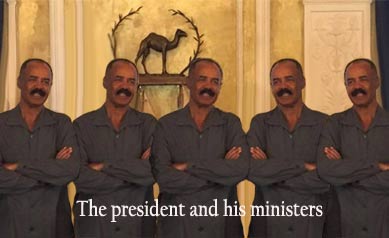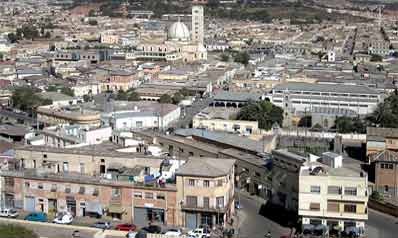The Eritrean “System” is a Monocracy

And in this case, the monocracy is a manocracy.
Welcome to the long-running debate between Awatista columnist Amanuel Hidrat and Al-Nahda on whether the regime lording over Eritrea is “a system” (his position) or a One-Man-Show (my position.) In the past, each side presented arguments to make his case not as an intellectual excercise but to get to the fundamentals of “know thine enemy” (your opponent) so that you can propose effective strategies to defeat him.
This article is not the argument I had teased in the Awate Forum. There, I had argued that Eritrean opposition doesn’t begin with the end in mind–how to win; instead, it is entirely based on what must I do to register my outrage at the actions of the regime–taking a stand! There is no minimum eligibility requirement, no training, no metric, no goal to being an activist. All that is required is the will to be one. Thus, activism is its own reward. This is despite the fact that there are a number of good documents–source materials–which tell us how to be an effective activist. Have you targeted your audience? Do you have a script? Do you know how many flyers you must give to get one convert? Is it a coincidence that your neighborhood Jehovah’s Witness activist rides a bicycle and wears a suit? Are you of the right temperament to be an activist?
Activists do NOT have to be nice persons or even easy to get along with. Ralph Nader is probably considered one of the most effective activists–having invented the entire consumer protection movement in the US–but as one of his disciples, Michael Kinsely, once wrote: “I wouldn’t want to be his roommate.”
A good activist is an effective activist. Effective is just another way of saying the person has more wins than losses. To do that, the activist must be a natural, or trained—but the goal is to be effective. We have re-defined what effective means. Simply put, staying alive has become the definition of success in activism. Not how many members you have recruited, not their level of commitment: just staying alive and not dying. A meeting was organized, a meeting was held, the meeting passed resolutions. Success!
But that is an article that awaits further fleshing out and, honestly, a lot of self-appraisal. It will require more time than I have now. In this article, I will only focus on outlining the difference between monocracy and a system. If you say, well, monocracy is also a system, you win. In his two-parter, Abdulrezaq Kerar has made very good arguments as to why it is not a system. His argument was countered by a well-thought-out piece by Amanuel Hidrat. While I agree with Abdulrezaq’s piece, I will try to approach it from a different angle. As you read it, keep one thing in mind: which school of thought helps us win? Does defining the Eritrean regime as a manocracy do that? If it doesn’t, and it is a pointless exercise, we all have better things not to do. Pray with me that I keep this short: I have to: because it is a borrowed argument. And I am borrowing it from…feminism. All that you are required to do is see if it is analogous to dictatorship in Eritrea.
Systems
But let’s begin with a system. What is a system? Well, you and I and everybody reading this has one. In fact, several. A cardiovascular system which circulates blood. A digestive system that breaks down whatever unwise thing we put in front of our mouth. A muscular system, a skeletal system, and a respiratory system and so on. Even those of us who struggled with our biology classes remember one thing about what makes them a “system”: they work autonomously without much conscious effort from us so that we don’t forget to breathe and die. Even the one that requires effort, like the reproductive system, is one hard wired in us so that we don’t become extinct.
A system, then, is an intricate bio-feedback mechanism that ensures that the human body is functioning at optimal level. It is made up of agents that specialize in one task (they are not fungible) and, if they are not performing at what they mindlessly function at, you don’t yell at them but at the Mind.
That’s all good and well but has nothing to do with politics, you say. Actually, you didn’t say that: your defense mechanism (another system) said that. So what is a system as it relates to politics? I was going to refer you to wikipedia but for all you know I could have just edited it so let’s use something a bit fancier: Encylopedia Britannica. A political system is:
the set of formal legal institutions that constitute a “government” or a “state.” … The term comprehends actual as well as prescribed forms of political behaviour, not only the legal organization of the state but also the reality of how the state functions. Still more broadly defined, the political system is seen as a set of “processes of interaction” or as a subsystem of the social system interacting with other nonpolitical subsystems, such as the economic system. This points to the importance of informal sociopolitical processes and emphasizes the study of political development.
Notice that a political system doesn’t define theory but practice–“how the state functions”. Notice also that a political system is actually a part of a whole, the whole being the “social system” and how it interacts with other systems including economic. To argue that there is no system in Eritrea is to argue that Isaias is the Alpha and the Omega of the system and that he is in charge of not only the political system in Eritrea but every non-political system as well. It is to argue that all the other parts of the system are not, like the systems in our body, self-sustaining, but entirely dependent upon his generosity. It is not to argue that this monocracy is not coherent; it is to argue that its coherence is entirely dependent on one man. It is also to argue that it didn’t always used to be this way but it evolved into such a monocracy after a long period.
Briefly, it is this. While he was always the Main Man, there was a period of time during the life of the PLF/EPLF (1971-1994) and the first 7 years of the PFDJ (1994-2001) that Isaias Afwerki shared the spotlight with the central committee/politbureau. Between 1994 and 2001, the President started centralizing decision making, to an extreme claimed the G-15:
The problem is that the President is conducting himself in an illegal and unconstitutional manner, is refusing to consult, and the legislative and executive bodies have not performed their oversight functions properly.
Oh, not at all, protested Isaias Afwerki. In fact, he said, the problem is the exact opposite: power is too diffused and the G-15, who are part of the government, spend all their days criticizing the government:
The problem, in its essence, is not excessive intervention and control; it is lack of control. So much so, that in Eritrea, ministers and senior officials openly criticize the government policies and its outlook, as if the issues are none of their concern. What is proper is that people should be given accountability commensurate with their authority.
That “debate” occured in 2000 and notice how each defines “the problem.” Now, in the last 16 years, where are we? Do we have a system? How centralized is it? And if it centralized to the point of one-man-rule, is it a system? Do we have one omnipotent president, one indispensable man surrounded by disposable tentacles or do we have a system where everyone has a role and there is a system that exists independent of the man?
Objectification
I found the answer to this question, by accident, in the literature of American feminist/philosopher Martha Nussbaum. She was trying to come up with an inventory of how men objectify women. Objectify, you will recall, means to degrade a subject (a doer, a person) into an object (someone that is at the receiving end of an act, an object.) Here’s her test, and then we will come back to the members of the “PFDJ system” and ask whether they are subjects or objects:
1. instrumentality: the treatment of a person as a tool for the objectifier’s purpose;
2. denial of autonomy: the treatment of a person as lacking in autonomy and self-determination;
3. inertness: the treatment of a person as lacking in agency, and perhaps also in activity;
4. fungibility: the treatment of a person as interchangeable with other objects;
5. violability: the treatment of a person as lacking in boundary-integrity;
6. ownership: the treatment of a person as something that is owned by another (can be bought or sold);
7. denial of subjectivity: the treatment of a person as something whose experiences and feelings (if any) need not be taken into account.
Take anyone in the PFDJ hierarchy no matter how powerful you think he is. Take Yemane Gebreab, take Wedi Kassa, take Simon Gebredengel, take Wedi Ephrem, take even Ramadan Mohammed Nur. Do you question my claim that Isaias Afwerki, and only Isaias Afwerki, can use them for his sole purpose? That he demands that they put their own independence and be subservient to the State himself? That they become his and only his agents? That they can be replaced at will, move from defense ministry to energy? That they shouldn’t assume they have any privacy and something that is just theirs? That he can make a deal with, say, Qatar, and just assign whomever to go to, say, Qatar (or Siberia) for 2 years? That their feelings and emotions are completely irrelevant?
That being the case, what we have in Eritrea is one subject and many objects. The fact that these objects, in the service of the Subject act like subjects themselves does not negate the fact that they are mere objects. One can speak of them as enablers–but only to the extent that a gun enables a person. It is still an object.


Awate Forum